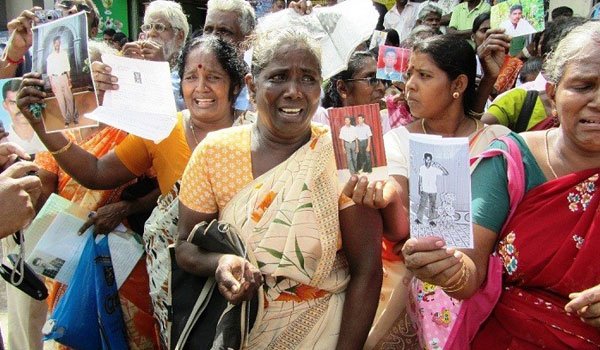As she points out quite rightly, the Office of Missing Persons (OMP Act No.14 of 2016) is going to be the first permanent body ‘tasked with searching and tracing missing persons’ established without a time frame. Past COIs had a time frame both for the life of the commission and for the period of the incidents to be looked into. But other than that, they too had the power to summon witnesses, access records, obtain information from detention centres and even accept evidence that did not fall within the limitation of the Evidence Ordinance.
Yet, as is widely accepted now, all these Commissions failed in their tasks. From the writer’s personal knowledge, these bodies were not to blame for that failure. They laboriously prepared comprehensive reports with appropriate recommendations. These findings were not made available to the public in their entirety. Many of the alleged perpetrators found implicated were also involved in later disappearances. So if this information had been available at that time, many of the subsequent disappearances would not have occurred.
Let us examine the provisions of the OMP to see if such a fate would not occur here as well. The OMP Act says that the Right to Information Law will not be applicable to ‘confidential’ information made available to the Office. In this writer’s view, this would eventually lead to the same failures of secretive information that befell the findings of the COIs mentioned above. If the OMP is not held to a higher standard, even if a witness wants to release the information to the public, the OMP can hold that back. As Ms. Pinto-Jayawardena has stated in her column, protection of witness information should have been specified more narrowly rather than relying totally on the OMP as to what amounts to ‘information received in confidence.’
Most frustratingly, Section 13(2) of the Act says that the findings ‘shall not give rise to any criminal or civil liability’. This is contrary to the expectations of victims who are eager to know what happened to their loved ones. Can they be told after exhaustive investigations that the OMP could not find the missing person and stop at that? Will a complainant who alleges that a particular person was personally handed over to a particular military officer or taken away by known police officers or other persons be satisfied if the OMP says they cannot now be found? What if the remains of the person concerned are found in one of the graves exhumed and the complainant is told that the OMP has no power to take any further action? That will create a public uproar.
Section 12(i) of the Act states that the OMP can report a possible offence to the relevant law enforcement or prosecuting authority. But that is exactly what happened to the findings of the COIs which provided a list of more than 2,000 persons against whom they found credible evidence of being responsible for disappearances. The files were passed on by the President’s Office to the then Missing Persons Unit of the Attorney General’s Department and to the Disappearances Investigation Unit of the CID. What happened to those cases is history. What is there to prevent the same happening to any cases the OMP may forward to the prosecuting authority?
Section 12 of the Act speaks of the investigative powers of the OMPs. Past COIs had almost the same powers. Investigation units headed by a senior retired Superintendents of Police with a handpicked team of police officers perused Police Information books at police stations. They found names of the ‘disappeared’ marked in the Diet Registers but absent in the corresponding entries of persons detained. Also, entries in the running charts of police vehicles mentioned that a team of police officers had visited particular villages at precisely the very same time that ‘disappearances’ occurred. This fact was denied when relations inquired. But no action was taken against the alleged perpetrators. The investigation reports gathered dust. What is there to prevent the same thing happening to investigation reports by the OMP?
Section 12(d) gives new powers to exhume suspected grave sites availing of a judicial order. Sufficient funds must be available for this, including mass graves of the late 1980s and early 1990s. Section 12(f) authorises an OMP officer to enter any place of detention without a warrant to look for a missing or disappeared person. This is a power already in the hands of the Human Rights Commission (HRC). The question is, has that power been actually used? Would the OMP make a difference in this case? Section 10(e) provides for data on missing persons to be collated. I was involved with the establishment of a Disappearances Data Base by the pre-2005 HRC which was aborted midway. Let us hope that this work would continue.
A note on the staffing and financing of the OMP would finally be appropriate. The Secretariat of the OMP does not appear to have a statutory head nor is there a mention of an accountant. Monies would be provided for the OMP from the Consolidated Fund. But the experience of the COIs shows that the financial independence of the OMP would be limited as it will be subservient to the authority of the Secretary to the President who is the Chief Accounting Officer of the Consolidated Fund. This could have been obviated if the Parliament was authorised by the Act to make direct allocation of funds to the OMP as they do to the Bribery Commission and the Commissioner of Elections. These are grave problems in the OMP law as passed by Parliament that come to mind.
By M.C.M. Iqbal
(The writer is a retired SLAS officer and was a Secretary to three Commissions of Inquiry into Disappearances.)
(Sundaytimes.lk)






